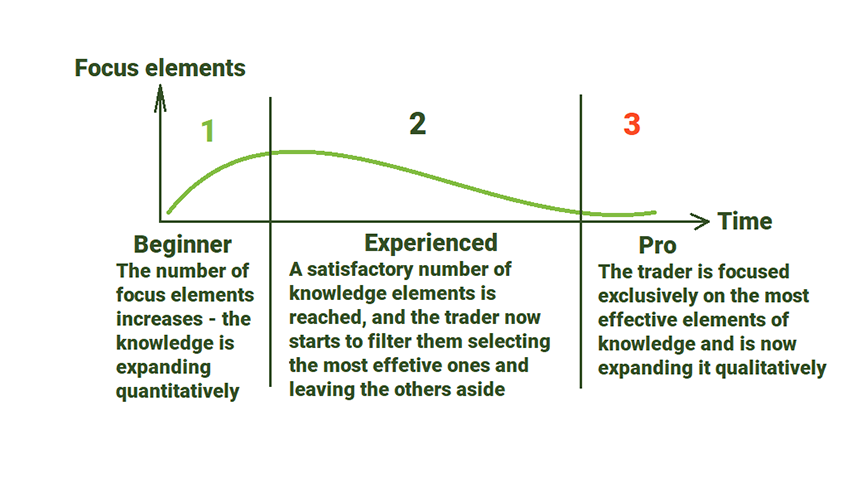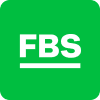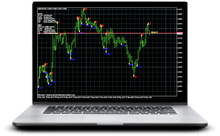Becoming a pro: dialectics of studying

Information is not investment advice.
The stages of learning
Every development process is particular to the one who is studying. The same applies to trading skills. Although all traders have similar objectives – becoming more efficient and earning more – the paths they take may be different. Still, what is the difference between a pro and just an experienced person? In trading, just like in the other areas of life, such difference is in the ease at which a pro reaches his targets, while a lower-level practitioner needs more time, energy, and other resources to reach the same goal. What does it mean?
Here is how a studying process normally goes.
First, a beginner starts investigating the matter. Digging deeper into the subject and discovering new indicators, news, instruments, techniques, etc., they gain knowledge. As they carry on, they become more experienced and consistent in regular profits.
Later, after having passed a certain threshold, a trader stops discovering that much about trading anymore. It doesn’t mean that they stopped expanding knowledge – they still go on studying. However, they now focus on specific things that are applicable to their own way of trading. They don’t uselessly spend time studying something that they know won’t be useful for them – they are very selective with the items they want to investigate and research. Knowing their professional sphere of interest and already having an established base of knowledge, a trader gradually reduces the number of knowledge elements in focus.
Finally, polishing his/her knowledge base more and more, a trader comes to a bare minimum that they require to operate at full capacity and keep reaching financial goals. Again, that doesn’t mean that the process of studying stops – it continues, but is narrowed down to the very specific areas of knowledge of this particular trader. They now go in-depth with very particular items to maximize the efficiency of using them to the highest possible level.

In a nutshell, this process is but a law of nature that reflects how species evolve in each macro-period. First, there is an initial biosphere with a little number of species and minimal diversity. Then everything just keeps expanding in numbers, types, classes, etc. Finally, each class and type gets more and more specialized in its own sphere of life and survival and becomes “professional” there while the rest just slowly die out.
How you should do it?
What can all that say about becoming a pro in trading? You will find some recommendations below.
#1 – Keep expanding your knowledge
The sky is the limit. Professional traders are always in search of new things that will make their actions even more efficient. Having a wide knowledge base provides enough freedom of choice and width of observation.
#2 – Separate the wheat from the chaff
In simple terms: filter. Try to understand what does and what doesn’t fit you in trading. Every person has their own temperament and features. Someone is full of patience; another is able to keep a cool head during the stressful periods. As a result, a trading strategy that fits one, won’t suit the other. The same is true for the methods of analysis: some traders can achieve spectacular results by trading the news, while others prefer a particular set of technical indicators. Find what is truly yours and cut the rest. Eventually, you will gather a bare minimum of instruments you need to “see” the market.
#3 – Master your tools and find your Zen
The latter is what makes a pro – knowing all details about the very specifics of selected items. Therefore, your objective after you have chosen those items is to go in-depth in learning how they work in different situations. You also need to realize that true mastery takes time. As a result, set your heart on self-development and steady progress.
Was this article helpful? Do you want to speed up on the way to becoming a professional trader? If so, check the list of books that will help you develop your trading skills:
- High Probability Trading: Take the Steps to Become a Successful Trader by Marcel Link.
- The Disciplined Trader: Developing Winning Attitudes by Mark Douglas.
- Trade Your Way to Financial Freedom by Van Tharp.




